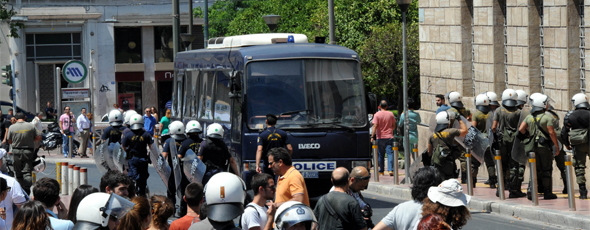 For anyone watching what was happening at the central building of the University of Athens on July 8 2013 the feeling was one of reliving images from the 1967-1974 military dictatorship, especially if we take into consideration that collective memory in Greece is still haunted by the image of a military tank crashing the gate of the National Polytechnic University during the November 1973 student uprising.
For anyone watching what was happening at the central building of the University of Athens on July 8 2013 the feeling was one of reliving images from the 1967-1974 military dictatorship, especially if we take into consideration that collective memory in Greece is still haunted by the image of a military tank crashing the gate of the National Polytechnic University during the November 1973 student uprising.
Tens of riot policemen and special police units in full gear surrounded and stormed the building and arrested 31 students who were peacefully protesting against changes in the administration of Greek universities and especially the introduction of ‘University Councils’ as the main governing bodies of Greek Higher Education, as part of the latest wave of university reforms.
University Councils, modeled after the new forms of academic management spreading all over Europe, are comprised of academics and representatives of ‘society’ and the ‘business community’ and have been criticized as undermining academic democracy and enhancing an aggressively entrepreneurial conception of Higher Education. Both University Teachers’ Unions and Student Unions have waged a long battle against university councils and the July 8 protest was part of this battle.
However, this time the president of the University of Athens Councils, Prof. Dimitri Bertsimas, an MIT professor, chose to call the police, stating that he and the other members of the council were in danger. The call to the police was made by Vaso Kinti, a philosophy professor well known for her support to aggressive neoliberal reforms.
Since the Right of Asylum in Universities, the explicit ban on forces of order to enter University premises has been lifted, as part of the latest wave of university reforms, there was no legal obstacle to the police invasion. The police stormed the building and arrested the students. Police were even ready to use an angle grinder to open another door and arrest the rest of the protesting students, when under the protests of union representatives and members of parliament they were ordered to withdraw. In the end all students were set free and no charges were pressed against them, but the problem of a brutal police attack against a legitimate student protest remains.
This case highlights the motivation behind the decision to abolish University Asylum. For many years those supporting giving police the right to intervene inside university premises (including the US Ambassador in Athens!) insisted that this is a necessary measure to prevent violent rioting. In contrast, supporters of the university sanctuary warned that such a measure would lead to the police invading universities in order to arrest protesting students and striking professors. It is now becoming obvious that we are witnessing an authoritarian institutional transformation of Greek Higher Education, aiming at restricting the ability of the student movement and the university movement in general to raise obstacles to the shift towards a more entrepreneurial Higher Education.
The Greek Student Movement has a long history of successful struggles in the past 35 years, governments have been forced to repeal laws or even the 2007 constitutional reform under the pressure of mass student movements, and all these can explain why radical student practices are now being targeted as part of the broader undemocratic and authoritarian turn that has accompanied the austerity packaged and the EU-IMF-ECB supervision. It is the same authoritarian turn that led to shutting down Greek Public Radio and Television (ERT) and keeps hunger striker Kostas Sakkas in prison for more than 30 months without trial.
Hopefully, students, university teachers and other higher education personnel have insisted that they are not intimidated by such developments and that they will continue struggling against the neoliberal transformation of Higher Education, including struggling against any attempts to make ‘University Councils’ the main governing bodies of Greek Universities. The fight is far from over.
By Panagiotis Sotiris | Panagiotis Sotiris teaches social theory and social and political philosophy at the Department of Sociology of the University of the Aegean. He can be reached at psot@soc.aegean.gr
This article was originally published at Radiobubble









